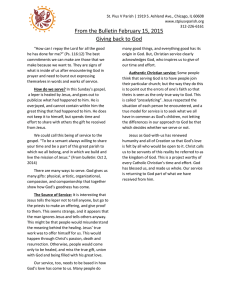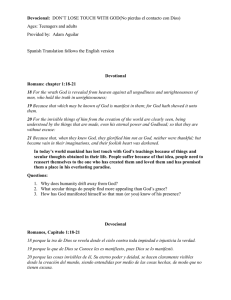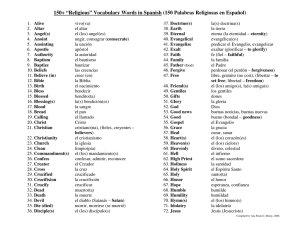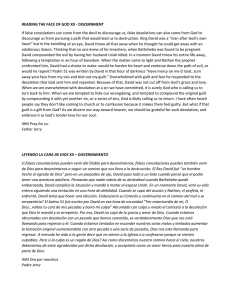From the Bulletin November 23, 2014 Praying for the Kingdom
Anuncio
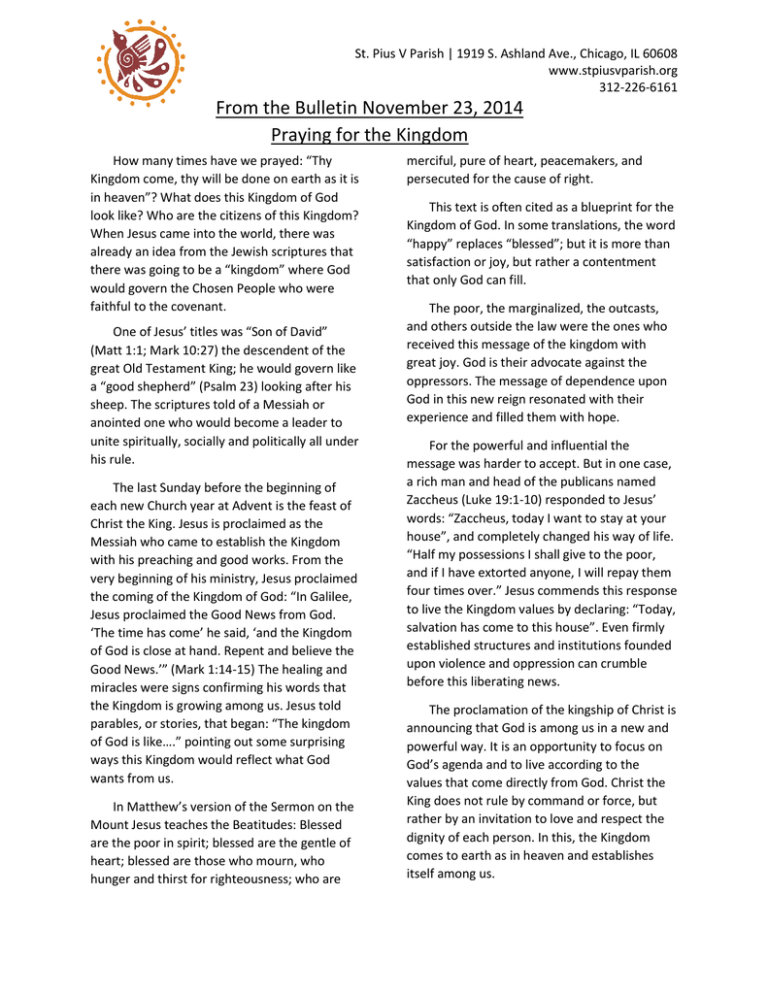
St. Pius V Parish | 1919 S. Ashland Ave., Chicago, IL 60608 www.stpiusvparish.org 312-226-6161 From the Bulletin November 23, 2014 Praying for the Kingdom How many times have we prayed: “Thy Kingdom come, thy will be done on earth as it is in heaven”? What does this Kingdom of God look like? Who are the citizens of this Kingdom? When Jesus came into the world, there was already an idea from the Jewish scriptures that there was going to be a “kingdom” where God would govern the Chosen People who were faithful to the covenant. One of Jesus’ titles was “Son of David” (Matt 1:1; Mark 10:27) the descendent of the great Old Testament King; he would govern like a “good shepherd” (Psalm 23) looking after his sheep. The scriptures told of a Messiah or anointed one who would become a leader to unite spiritually, socially and politically all under his rule. The last Sunday before the beginning of each new Church year at Advent is the feast of Christ the King. Jesus is proclaimed as the Messiah who came to establish the Kingdom with his preaching and good works. From the very beginning of his ministry, Jesus proclaimed the coming of the Kingdom of God: “In Galilee, Jesus proclaimed the Good News from God. ‘The time has come’ he said, ‘and the Kingdom of God is close at hand. Repent and believe the Good News.’” (Mark 1:14-15) The healing and miracles were signs confirming his words that the Kingdom is growing among us. Jesus told parables, or stories, that began: “The kingdom of God is like….” pointing out some surprising ways this Kingdom would reflect what God wants from us. In Matthew’s version of the Sermon on the Mount Jesus teaches the Beatitudes: Blessed are the poor in spirit; blessed are the gentle of heart; blessed are those who mourn, who hunger and thirst for righteousness; who are merciful, pure of heart, peacemakers, and persecuted for the cause of right. This text is often cited as a blueprint for the Kingdom of God. In some translations, the word “happy” replaces “blessed”; but it is more than satisfaction or joy, but rather a contentment that only God can fill. The poor, the marginalized, the outcasts, and others outside the law were the ones who received this message of the kingdom with great joy. God is their advocate against the oppressors. The message of dependence upon God in this new reign resonated with their experience and filled them with hope. For the powerful and influential the message was harder to accept. But in one case, a rich man and head of the publicans named Zaccheus (Luke 19:1-10) responded to Jesus’ words: “Zaccheus, today I want to stay at your house”, and completely changed his way of life. “Half my possessions I shall give to the poor, and if I have extorted anyone, I will repay them four times over.” Jesus commends this response to live the Kingdom values by declaring: “Today, salvation has come to this house”. Even firmly established structures and institutions founded upon violence and oppression can crumble before this liberating news. The proclamation of the kingship of Christ is announcing that God is among us in a new and powerful way. It is an opportunity to focus on God’s agenda and to live according to the values that come directly from God. Christ the King does not rule by command or force, but rather by an invitation to love and respect the dignity of each person. In this, the Kingdom comes to earth as in heaven and establishes itself among us. St. Pius V Parish | 1919 S. Ashland Ave., Chicago, IL 60608 www.stpiusvparish.org 312-226-6161 Del Boletín de 23 Noviembre 2014 Rezando por el Reino de Dios ¿Cuantas veces oramos; “Venga tu reino en la tierra como en el cielo”? ¿En que consiste el Reino de Dios? ¿Quienes son los ciudadanos del aquel reino? Cuando Jesús vino al mundo, había la idea en las escrituras de los judíos de un reinado del futuro en que Dios mismo fuera el Rey y gobernaría a su pueblo que cumplía fielmente el convenio hecho con Dios. Uno de los títulos de Jesús era “Hijo de David” (Mateo 1,1; Marcus 10,27) quién fuera un descendiente de David, un gran rey del pueblo; ese Hijo de David gobernara como un “buen pastor” (Salmo 22) cuidando a sus ovejas. Las escrituras contaban de un Mesías o ungido quien fuera un líder quien uniera espiritual, social y políticamente al pueblo bajo su reinado. El último domingo del año litúrgico antes de Adviento es la fiesta de Cristo Rey. Jesucristo es proclamado como el Mesías quien estableció el Reino de Dios con sus palabras y obras. Desde del principio de su ministerio público, Jesús proclama la venida del reino de Dios: “En Galilea, Jesús proclamaba la buena nueva de Dios. ‘Ya llega el momento’, dijo él, ‘y el reino de Dios está cerca. Arrepiéntanse y crean en la buena nueva’”. (Mc 1, 14-15) Los milagros y sanaciones eran signos que mostraron la presencia del reino. Jesús contaba parábolas que comenzaron: “El reino de Dios es como…” señalando algunas maneras sorprendentes como el reino se manifestara lo quiere Dios para nosotros. En el sermón en el monte de Mateo, Jesús comienza con las bienaventuranzas. Benditos sean los pobres del espíritu; los humildes de corazón; benditos los que lloran; los que tienen hambre y sed de justicia, los misericordiosos, los puros de corazón, los que trabajan por la paz, los perseguidos por su causa. Muchos se refieren a este texto como una esquema del reino de Dios. Algunas traducciones dicen “felices” en lugar de “benditos”; pero es más que un gozo o satisfacción transitoria, sino un contento que solo Dios puede dar. Los pobres y marginados eran los primeros en recibir el mensaje del reino con alegría. Dios sería su abogado contra sus opresores y malvados. En su necesidad, esta clase de gente aprendería aliarse en su dependencia mutua para estar en solidaridad el uno con el otro. El mensaje de depender de Dios en un nuevo reinado resonaba con su experiencia y los llenaba de esperanza. Para los ricos y poderosos, el mensaje del reino de Dios era más difícil aceptar. Pero en un caso, un rico y cobrador de impuestos, llamado Zaqueo, (Lc 19, 1-10) respondió a Jesús quien dijo: “Zaqueo, hoy deseo quedarme en su casa”, y él completamente cambió su vida: “Señor, daré la mitad de mis bienes a los pobres; y si en algo defraudé a alguien, le devolveré el cuádruple”. Jesús le felicitó por su compromiso de vivir los valores del reino, y declaró: “Hoy, la salvación ha llegado a esta casa”. Hasta las estructuras e instituciones fundadas en la opresión caen delante de esta noticia libertadora. La proclamación de Cristo como Rey nos dice que Dios está presente en una nueva y poderosa manera. Es una oportunidad enfocarnos en la agenda de Dios y vivir de acuerdo con los valores que Él nos enseñó. Cristo no reina por la fuerza sino por extender una invitación de amar y respectar la dignidad de cada persona. En esto, el reino de Dios llega a la tierra como existe en el cielo y se manifiesta en medio de nosotros.
